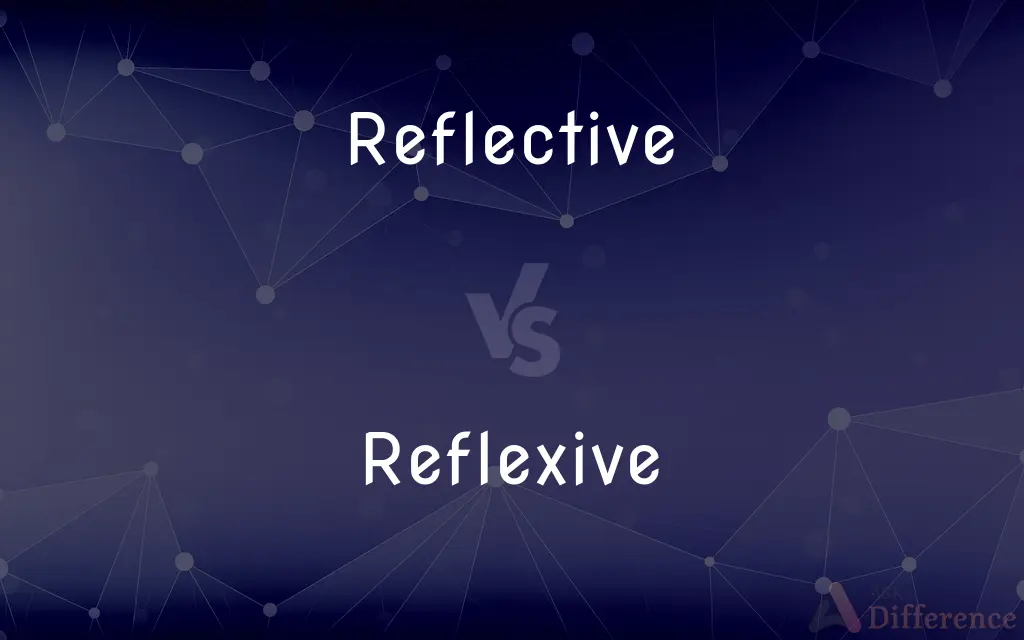Reflective vs. Reflexive — What's the Difference?
By Urooj Arif & Fiza Rafique — Updated on February 27, 2024
Reflective refers to the process of thoughtful consideration, often involving introspection and analysis, while reflexive relates to an automatic, involuntary response to stimuli without conscious thought.

Difference Between Reflective and Reflexive
Table of Contents
ADVERTISEMENT
Key Differences
Reflective thinking involves a deliberate and conscious process where individuals analyze their experiences, beliefs, and actions to gain deeper insights or understanding. This process is often used in learning, personal development, and problem-solving, enabling individuals to make more informed decisions and understand their behavior and the behavior of others. Reflexive actions, on the other hand, are automatic responses that occur without conscious thought, such as blinking in response to a bright light or withdrawing a hand from a hot surface. These actions are immediate and do not involve reflection or deliberate thought.
Reflective practices are common in educational settings, professional development, and therapy, where individuals are encouraged to consider their experiences, feelings, and responses to improve future outcomes. Reflexive actions are physiological or psychological responses that serve protective or regulatory functions, often discussed in the context of biology, psychology, and sociology.
Reflection requires time, attention, and often a quiet space for contemplation, reflexive actions happen instantaneously, demonstrating the body's ability to respond rapidly to environmental changes. The reflective process can lead to personal growth, change in perspective, and deeper understanding, whereas reflexive responses are primarily about immediate adaptation and protection.
The distinction between reflective and reflexive is not just about the speed or level of consciousness involved in the response but also about the purpose and outcome of each. Reflective processes aim to build knowledge, awareness, and understanding, contributing to long-term personal or professional development. Reflexive responses, while not contributing directly to personal growth, play a critical role in maintaining safety and homeostasis.
Comparison Chart
Definition
Involves thoughtful consideration and introspection.
Automatic, involuntary response to stimuli.
ADVERTISEMENT
Process
Deliberate, conscious analysis.
Instantaneous, without conscious thought.
Purpose
To gain insights, understanding, and improve future outcomes.
Immediate adaptation and protection.
Context
Learning, personal development, therapy.
Biological, psychological, physiological responses.
Outcome
Personal growth, change in perspective.
Rapid adaptation to environmental changes.
Compare with Definitions
Reflective
Thoughtful Analysis.
Reflective journaling helps students understand their learning process.
Reflexive
Involuntary Actions.
Reflexive breathing patterns adjust to oxygen needs during exercise.
Reflective
Professional Growth.
Reflective discussions in team meetings improve collaboration and outcomes.
Reflexive
Immediate Adaptation.
Reflexive responses help quickly adjust to sudden environmental changes.
Reflective
Informed Decisions.
Reflective consideration of past mistakes led to better decision-making.
Reflexive
Protective Function.
The reflexive coughing when choking clears the airway.
Reflective
Personal Development.
Through reflective practice, she gained insight into her communication style.
Reflexive
Automatic Response.
His reflexive action was to blink when the ball came close to his face.
Reflective
Deep Understanding.
Reflective therapy sessions helped him understand the roots of his anxiety.
Reflexive
Physiological Reaction.
Reflexive withdrawal from a hot surface prevents burns.
Reflective
Relating to or characterized by deep thought; thoughtful
A quiet, reflective, astute man
Reflective
Characterized by or given to serious thinking or contemplation; thoughtful.
Common Curiosities
Can reflective practice change reflexive responses?
While reflexive responses are automatic, understanding them through reflective practice can influence how one responds to or perceives certain stimuli in the future.
What is the main difference between reflective and reflexive actions?
Reflective actions involve conscious thought and introspection, while reflexive actions are automatic and involuntary.
Can someone be both reflective and reflexive?
Yes, individuals exhibit both reflective thinking in cognitive processes and reflexive responses to physical stimuli.
Is being reflexive ever considered a disadvantage?
In situations where automatic responses conflict with desired actions, such as overreacting to a perceived threat, it can be.
How can one develop reflective thinking skills?
Through practices like journaling, meditation, and engaging in dialogues that encourage introspection and analysis.
What role do reflexive responses play in survival?
They provide quick reactions to potential threats, protecting the body from harm and maintaining homeostasis.
What is the significance of reflexive sociology?
It involves researchers reflecting on their own influence on the research process, aiming for greater objectivity and awareness.
How does reflective thinking benefit learning?
It encourages deeper understanding, critical thinking, and the application of knowledge to new situations.
What examples demonstrate the reflexive nature of language?
Reflexive pronouns like "myself" or "ourselves" indicate that the action of the verb is performed by and directed at the same subject.
How does reflective therapy work?
It helps individuals explore and understand their thoughts, emotions, and behaviors to foster healing and growth.
Are reflexive responses learned or innate?
Most reflexive responses are innate, providing immediate reactions to certain stimuli, though some reflexes can be conditioned.
Can reflective practices be applied in conflict resolution?
Yes, by encouraging parties to reflect on their perspectives and behaviors, promoting understanding and empathy.
Why is reflection important in professional settings?
It fosters continuous improvement, adaptability, and the development of more effective strategies and solutions.
How do educators use reflective practices in teaching?
They encourage students to analyze their learning experiences, fostering deeper engagement and understanding of material.
Can reflexive actions be modified?
Some reflexive responses, especially those influenced by conditioning, can be modified through training and habituation.
Share Your Discovery

Previous Comparison
Prima vs. Donna
Next Comparison
Vehicle vs. AutomobileAuthor Spotlight
Written by
Urooj ArifUrooj is a skilled content writer at Ask Difference, known for her exceptional ability to simplify complex topics into engaging and informative content. With a passion for research and a flair for clear, concise writing, she consistently delivers articles that resonate with our diverse audience.
Co-written by
Fiza RafiqueFiza Rafique is a skilled content writer at AskDifference.com, where she meticulously refines and enhances written pieces. Drawing from her vast editorial expertise, Fiza ensures clarity, accuracy, and precision in every article. Passionate about language, she continually seeks to elevate the quality of content for readers worldwide.















































